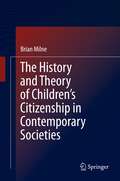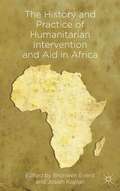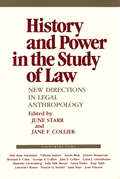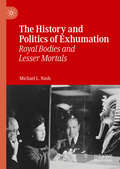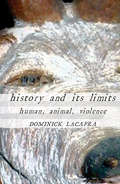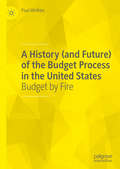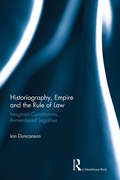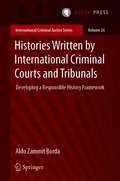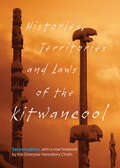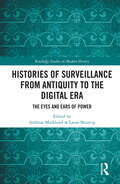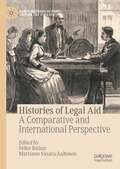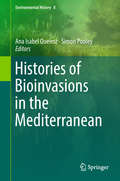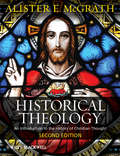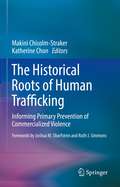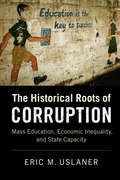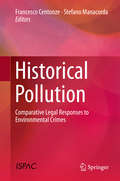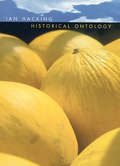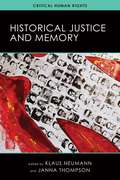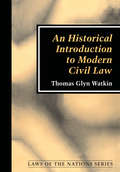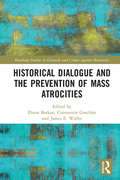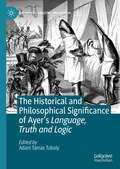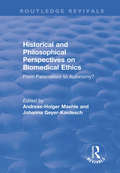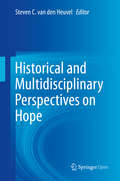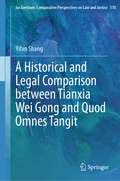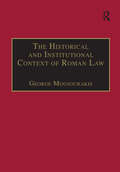- Table View
- List View
The History and Theory of Children’s Citizenship in Contemporary Societies
by Brian MilneThis book examines the notion of children having full citizenship. It does so historically, through intellectual discourse, beliefs, and moral and ideological positions on children. It looks at the status and extent of knowledge of the position of children covering about 2500 years. The book takes European and other cultures, traditions and beliefs into consideration. It reflects on the topic from a variety of disciplines, including social sciences, theology and philosophy. The book places children's citizenship in the centre of children's rights discourse. Part of the work is a critical appraisal of 'children's participation' because it diverts attention away from children as members of society toward being a separable group. The book moves on from child participation using a children's rights based argument toward examination of the relationship of the child with the state, i.e. as potentially full member citizens.
The History and Practice of Humanitarian Intervention and Aid in Africa
by Bronwen Everill Josiah KaplanThe history of humanitarian intervention has often overlooked Africa. This book brings together perspectives from history, cultural studies, international relations, policy, and non-governmental organizations to analyze the themes, continuities and discontinuities in Western humanitarian engagement with Africa.
History and Power in the Study of Law: New Directions in Legal Anthropology (The Anthropology of Contemporary Issues)
by June Starr Jane F. CollierBuilding on earlier work in the anthropology of law and taking a critical stance toward it, June Starr and Jane F. Collier ask, "Should social anthropologists continue to isolate the ‘legal’ as a separate field of study?" To answer this question, they confront critics of legal anthropology who suggest that the subfield is dying and advocate a reintegration of legal anthropology into a renewed general anthropology. Chapters by anthropologists, sociologists, and law professors, using anthropological rather than legal methodologies, provide original analyses of particular legal developments. Some contributors adopt an interpretative approach, focusing on law as a system of meaning; others adopt a materialistic approach, analyzing the economic and political forces that historically shaped relations between social groups. Contributors include Said Armir Arjomand, Anton Blok, Bernard Cohn, George Collier, Carol Greenhouse, Sally Falk Moore, Laura Nader, June Nash, Lawrence Rosen, June Starr, and Joan Vincent.
The History and Politics of Exhumation: Royal Bodies and Lesser Mortals
by Michael L. NashThis book argues that a serious, scholarly study on exhumation is long overdue. Examining more well-known cases, such as that of Richard III, the Romanovs, and Tutankhamen, alongside the more obscure, Michael Nash explores the motivations beyond exhumation, from retribution to repatriation. Along the way, he explores the influence of Gothic fiction in the eighteenth century, the notoriety of the Ressurection Men in the nineteenth century, and the archeological heyday of the twentieth century.
History and Its Limits: Human, Animal, Violence
by Dominick LacapraDominick LaCapra's History and Its Limits articulates the relations among intellectual history, cultural history, and critical theory, examining the recent rise of "Practice Theory" and probing the limitations of prevalent forms of humanism. LaCapra focuses on the problem of understanding extreme cases, specifically events and experiences involving violence and victimization. He asks how historians treat and are simultaneously implicated in the traumatic processes they attempt to represent. In addressing these questions, he also investigates violence's impact on various types of writing and establishes a distinctive role for critical theory in the face of an insufficiently discriminating aesthetic of the sublime (often unreflectively amalgamated with the uncanny). In History and Its Limits, LaCapra inquires into the related phenomenon of a turn to the "postsecular," even the messianic or the miraculous, in recent theoretical discussions of extreme events by such prominent figures as Giorgio Agamben, Eric L. Santner, and Slavoj Zizek. In a related vein, he discusses Martin Heidegger's evocative, if not enchanting, understanding of "The Origin of the Work of Art." LaCapra subjects to critical scrutiny the sometimes internally divided way in which violence has been valorized in sacrificial, regenerative, or redemptive terms by a series of important modern intellectuals on both the far right and the far left, including Georges Sorel, the early Walter Benjamin, Georges Bataille, Frantz Fanon, and Ernst Jünger. Violence and victimization are prominent in the relation between the human and the animal. LaCapra questions prevalent anthropocentrism (evident even in theorists of the "posthuman") and the long-standing quest for a decisive criterion separating or dividing the human from the animal. LaCapra regards this attempt to fix the difference as misguided and potentially dangerous because it renders insufficiently problematic the manner in which humans treat other animals and interact with the environment. In raising the issue of desirable transformations in modernity, History and Its Limits examines the legitimacy of normative limits necessary for life in common and explores the disconcerting role of transgressive initiatives beyond limits (including limits blocking the recognition that humans are themselves animals).
A History (and Future) of the Budget Process in the United States: Budget by Fire
by Paul WinfreeThe United States has one of the most unique budgeting processes of any modern government. The “powers of the purse” are enumerated under the Constitution, but they were hotly debated by the nation’s founding fathers. However, the lack of a legal guide for exactly how to delegate the powers, and under what conditions, has led to a process marked by power struggles—primarily between Congress and the presidency—over the last 230 years. Still, the budget and appropriations process is central to the functioning of the federal government. This book covers the transformation of American government through the lens of shifting budgeting power, while documenting the evolution of economic policy through the federal budget. As the nation and the federal government have expanded, the budget process has entirely broken down. This book also recommends changes that would help the budget process function more effectively. The chapters are organized both chronologically and topically to help the reader think through the evolution of the budget process. With its comprehensive approach to the history of the budget process—covering the entirety of US federal existence—this book will be a go-to resource for academics and public policy professionals interested in Congressional and executive history.
Historiography, Empire and the Rule of Law: Imagined Constitutions, Remembered Legalities
by Ian DuncansonHistoriography, Empire and the Rule of Law considers the intersection of these terms in the historical development of what has come to be known as the ‘rule of law’. The separation of governmental powers, checks and balances, and judicial independence signified something entirely new in the way in which politics was imagined and practiced. This ‘rule of law’ cannot, as it often is, be traced to the justification and practice of government as originating in a social contract among the governed; but rather, by analogy with a popular conveyancing innovation of the era, to the trust – a device by which the power of ownership of land could be restrained. But how could the restraint of power remain consistent with the avoidance of anarchic disagreement among those granted the task of supervision and restraint? In response, it is argued here, the central legal and political task became one of managing disagreement and change peacefully and constructively – by drawing on a colonial tradition that emphasised civility, negotiation and compromise. And the study of all of these qualities as they evolved, Ian Duncanson contends, is vital to understanding the emergence of the ‘rule of law’. Historiography, Empire and the Rule of Law will be invaluable for all those engaged in research and the postgraduate study of socio-legal and constitutional studies, and early modern and modern history.
Histories Written by International Criminal Courts and Tribunals: Developing a Responsible History Framework (International Criminal Justice Series #26)
by Aldo Zammit BordaThis book argues for a more moderate approach to history-writing in international criminal adjudication by articulating the elements of a “responsible history” normative framework. The question of whether international criminal courts and tribunals (ICTs) ought to write historical narratives has gained renewed relevance in the context of the recent turn to history in international criminal law, the growing attention to the historical legacies of the ad hoc Tribunals and the minimal attention paid to historical context in the first judgment of the International Criminal Court.The starting point for this discussion is that, in cases of mass atrocities, prosecutors and judges are inevitably understood to be engaged in writing history and influencing collective memory, whether or not they so intend. Therefore, while writing history is an inescapable feature of ICTs, there is still today a significant lack of consensus over the proper place of this function. Since Hannah Arendt articulated her doctrine of strict legality, in response to the prosecutor’s expansive didactic approach in Eichmann, the legal debate on the subject has been largely polarised between restrictive and expansive approaches to history-writing in mass atrocity trials. What has been noticeably missing from this debate is the middle ground. The contribution this book seeks to make is precisely to articulate a framework that occupies that ground. The book asks: what are the lenses through which judges of ICTs interpret historical events, what kind of histories do ICTs write? and what kinds of histories should ICTs produce? Its arguments for a more moderate approach to history-writing are based on three distinct, but interrelated grounds: (1) Truth and Justice; (2) Right to Truth; and (3) Legal Epistemology.Different target audiences may benefit from this book. Court officials and legal practitioners may find the normative framework developed herein useful in addressing the tensions between the competing objectives of ICTs and, in particular, in assessing the value of the history-writing function. Lawyers, historians and other academics may also find the analysis of the strengths, constraints and blind spots of the historical narratives written by ICTs interesting. This issue is particularly timely in view of current debates on the legacies of ICTs.Aldo Zammit Borda is Director of the Centre for Access to Justice and Inclusion at Anglia Ruskin University, Cambridge, UK.
Histories, Territories and Laws of the Kitwancool: Second Edition, with a New Foreword by the Gitanyow Hereditary Chiefs
by Maggie Good B. W. McKilvington Peter Williams Walter Derrick Solomon Good Walter Douse Ernest Smith Fred GoodA new edition of the groundbreaking 1958 publication created in collaboration with the Gitanyow Hereditary Chiefs.This beautiful new edition of the histories and laws of the Gitanyow (literally “people of the small/narrow place,” once called the Kitwancool in settler accounts), as recounted to museum curator Wilson Duff in 1958, includes a new foreword by Gitanyow Hereditary Chiefs while preserving the original text. Until the mid-twentieth century, the village of Kitwancool (now Gitanyow) was only accessible to outsiders by trail. This inaccessibility of territory protected a deeply independent spirit and unique legal system, recorded here as part of an agreement that allowed for the removal of Gitanyow totem poles to the Royal BC Museum for preservation. The complete histories of the Gitanyow, told in their own words, were also translated and recorded here as part of the same agreement.This publication not only captures the histories, territories and laws of the Gitanyow, but also a significant moment in time for settler-Indigenous relations, and the origin story for totem poles still standing at the Royal BC Museum today.Histories, Territories and Laws of the Kitwancool is a must-read for anyone who wants to understand Gitanyow society and belief.
Histories of Surveillance from Antiquity to the Digital Era: The Eyes and Ears of Power (Routledge Studies in Modern History)
by Andreas Marklund; Laura SkouvigDeploying empirical studies spanning from early Imperial China to the present day, 17 scholars from across the globe explore the history of surveillance with special attention to the mechanisms of power that impel the concept of surveillance in society. By delving into a broad range of historical periods and contexts, the book sheds new light on surveillance as a societal phenomenon, offering 10 in-depth, applied analyses that revolve around two main questions: • Who are the central actors in the history of surveillance? • What kinds of phenomena have been deemed eligible for surveillance, for example, information flows, political movements, border-crossing trade, interacting with foreign states, workplace relations, gender relations, andsexuality?
Histories of Legal Aid: A Comparative and International Perspective (World Histories of Crime, Culture and Violence)
by Felice Batlan Marianne Vasara-AaltonenThis book focuses on the history of the provision of legal aid and legal assistance to the poor in the nineteenth and twentieth centuries in eight different countries. It is the first such book to bring together historical work on legal aid in a comparative perspective, and allows readers to analogise and contrast historical narratives about free legal aid across countries. Legal aid developed as a result of industrialisation, urbanization, immigration, the rise of philanthropy, and what were viewed as new legal problems. Closely related, was the growing professionalisation of lawyers and the question of what duties lawyers owed society to perform free work. Yet, legal aid providers in many countries included lay women and men, leading at times to tensions with the bar. Furthermore, legal aid often became deeply politicized, creating dramatic conflicts concerning the rights of the poor to have equal access to justice.
Histories of Bioinvasions in the Mediterranean (Environmental History Ser. #8)
by Ana Isabel Queiroz Simon PooleyBioinvasions is a current top research subject for natural sciences, social sciences and humanities and a major concern for conservationists, land managers and planners. In the last decades, new findings, perspectives and practices have revealed the multifaceted challenges of preventing new introductions and dealing with those invasive species that harm natural ecosystems, economy and human welfare. This book brings together environmental historians and natural scientists to share their studies and experiences on the human dimensions of biological invasions from the ancient past to the current challenges. The collection of papers focuses on the Mediterranean region and deals with aquatic and terrestrial ecosystems on the mainland and islands, ranging from marine and freshwater environments to coastal marshlands and forests. A wide diversity of animals and plants are featured, from marine fishes to marine and freshwater crustaceans, invertebrates, reptiles and amphibians, birds and mammals, to grasses, shrubs and trees. This book is a contribution to the scientific debate on how to deal with the historical dimensions of biological invasions, fostering dialogue between cultural and ecological explanations of environmental change, to inform environmental policy and management. It has been organized in three sections: the first is the editors’ introduction, in which they review the existing literature and highlight relevant concepts and ideas; the second is about alien species in the Mediterranean region; the third includes cases from other Mediterranean-type regions.
Historical Theology
by Alister E. McgrathFreshly updated for this second edition with considerable new material, this authoritative introduction to the history of Christian theology covers its development from the beginnings of the Patristic period just decades after Jesus's ministry, through to contemporary theological trends. A substantially updated new edition of this popular textbook exploring the entire history of Christian thought, written by the bestselling author and internationally-renowned theologian Features additional coverage of orthodox theology, the Holy Spirit, and medieval mysticism, alongside new sections on liberation, feminist, and Latino theologies, and on the global spread of Christianity Accessibly structured into four sections covering the Patristic period, the Middle Ages and Renaissance, the reformation and post-reformation eras, and the modern period spanning 1750 to the present day, addressing the key issues and people in each Includes case studies and primary readings at the end of each section, alongside comprehensive glossaries of key theologians, developments, and terminology Supported by additional resources available on publication at www. wiley. com/go/mcgrath
The Historical Roots of Human Trafficking: Informing Primary Prevention of Commercialized Violence
by Makini Chisolm-Straker Katherine ChonA public health approach to human trafficking requires a nuanced understanding of its root causes. This textbook applies a historical lens to human trafficking from expert resources for the multidisciplinary public health learner and worker. The book challenges the anti-trafficking paradigm to meaningfully understand historical legacies of present-day root-causes of human trafficking. This textbook focuses on history’s utility in public health. It describes history to contextualize and explain present times, and provides public health lessons in trafficking prevention and intervention. Public health recognizes the importance of multiple systems to solve big problems, so the chapters illustrate how current anti-trafficking efforts in markets and public systems connect with historical policies and data in the United States. Topics explored include:Capitalism, Colonialism, and Imperialism: Roots for Present-Day Trafficking Invisibility, Forced Labor, and Domestic Work Addressing Modern Slavery in Global Supply Chains: The Role of Businesses Immigration, Precarity, and Human Trafficking: Histories and Legacies of Asian American Racial Exclusion in the United StatesSystemic and Structural Roots of Child Sex Trafficking: The Role of Gender, Race, and Sexual Orientation in Disproportionate VictimizationThe Complexities of Complex Trauma: An Historical and Contemporary Review of Healing in the Aftermath of Commercialized Violence Historical Context Matters: Health Research, Health Care, and Bodies of Color in the United States Understanding linkages between contemporary manifestations of human trafficking with their respective historical roots offers meaningful insights into the roles of public policies, institutions, cultural beliefs, and socioeconomic norms in commercialized violence. The textbook identifies sustainable solutions to prevent human trafficking and improve the health of the Nation.The Historical Roots of Human Trafficking is essential reading for students of public health, health sciences, criminology, and social sciences; public health professionals; academics; anti-trafficking advocates, policy-makers, taskforces, funders, and organizations; legislators; and governmental agencies and administrators.
The Historical Roots of Corruption: Mass Education, Economic Inequality, and State Capacity
by Eric M. UslanerWhy does corruption persist over long periods of time? Why is it so difficult to eliminate? Suggesting that corruption is deeply rooted in the underlying social and historical political structures of a country, Uslaner observes that there is a powerful statistical relationship between levels of mass education in 1870 and corruption levels in 2010 across 78 countries. He argues that an early introduction of universal education is shown to be linked to levels of economic equality and to efforts to increase state capacity. Societies with more equal education gave citizens more opportunities and power for opposing corruption, whilst the need for increased state capacity was a strong motivation for the introduction of universal education in many countries. Evidence for this argument is presented from statistical models, case studies from Northern and Southern Europe, Asia, Africa, Latin America, the United States, Canada, Australia, and New Zealand, as well as a discussions of how some countries escaped the 'trap' of corruption.
Historical Pollution
by Francesco Centonze Stefano ManacordaThis volume examines legal matters regarding the prevention and fighting of historical pollution caused by industrial emissions. "Historical pollution" refers to the long-term or delayed onset effects of environmental crimes such as groundwater or soil pollution. Historical Pollution presents and compares national legal approaches, including the most interesting and effective mechanisms for managing environmental problems in relation with historical pollution. It features interdisciplinary and international comparisons of traditional and alternative justice mechanisms. This book will be of interest to researchers in criminology and criminal justice and related areas, such as politics, law, and economics, those in the public and private sectors dealing with environmental protection, including international institutions, corporations, specialized national agencies, those involved in the criminal justice system, and policymakers.
Historical Ontology
by Ian HackingWith the unusual clarity, distinctive and engaging style, and penetrating insight that have drawn such a wide range of readers to his work, Ian Hacking here offers his reflections on the philosophical uses of history. The focus of this volume, which collects both recent and now-classic essays, is the historical emergence of concepts and objects, through new uses of words and sentences in specific settings, and new patterns or styles of reasoning within those sentences. In its lucid and thoroughgoing look at the historical dimension of concepts, the book is at once a systematic formulation of Hacking's approach and its relation to other types of intellectual history, and a valuable contribution to philosophical understanding. Hacking opens the volume with an extended meditation on the philosophical significance of history. The importance of Michel Foucault--for the development of this theme, and for Hacking's own work in intellectual history--emerges in the following chapters, which place Hacking's classic essays on Foucault within the wider context of general reflections on historical methodology. Against this background, Hacking then develops ideas about how language, styles of reasoning, and "psychological" phenomena figure in the articulation of concepts--and in the very prospect of doing philosophy as historical ontology.
Historical Justice and Memory
by Klaus Neumann Janna ThompsonHistorical Justice and Memory highlights the global movement for historical justice--acknowledging and redressing historic wrongs--as one of the most significant moral and social developments of our times. Such historic wrongs include acts of genocide, slavery, systems of apartheid, the systematic persecution of presumed enemies of the state, colonialism, and the oppression of or discrimination against ethnic or religious minorities. The historical justice movement has inspired the spread of truth and reconciliation processes around the world and has pushed governments to make reparations and apologies for past wrongs. It has changed the public understanding of justice and the role of memory. In this book, leading scholars in philosophy, history, political science, and semiotics offer new essays that discuss and assess these momentous global developments. They evaluate the strength and weaknesses of the movement, its accomplishments and failings, its philosophical assumptions and social preconditions, and its prospects for the future.
An Historical Introduction to Modern Civil Law (Laws of the Nations Series #3)
by Thomas Glyn WatkinThe civil law systems of continental Europe, Latin America and other parts of the world, including Japan, share a common legal heritage derived from Roman law. However, it is an inheritance which has been modified and adapted over the centuries as a result of contact with Germanic legal concepts, the work of jurists in the mediaeval universities, the growth of the canon law of the western Church, the humanist scholarship of the Renaissance and the rationalism of the natural lawyers of the seventeenth and eighteenth centuries. This volume provides a critical appreciation of modern civilian systems by examining current rules and structures in the context of their 2,500 year development. It is not a narrative history of civil law, but an historical examination of the forces and influences which have shaped the form and the content of modern codes, as well as the legislative and judicial processes by which they are created are administered.
Historical Dialogue and the Prevention of Mass Atrocities (Routledge Studies in Genocide and Crimes against Humanity)
by Elazar Barkan Constantin Goschler James E. WallerThis book brings together a diverse range of international voices from academia, policymaking and civil society to address the failure to connect historical dialogue with atrocity prevention discourse and provide insight into how conflict histories and historical memory act as dynamic forces, actively facilitating or deterring current and future conflict. Established on a variety of international case studies combining theoretical and practical points of view, the book envisions an integrated understanding of how historical dialogue can inform policy, education, and the practice of atrocity prevention. In doing so, it provides a vital basis for the development of preventive policies sensitive to the importance of conflict histories and for further academic study on the topic. It will be of interest to all scholars and students of history, psychology, peace studies, international relations and political science.
The Historical and Philosophical Significance of Ayer’s Language, Truth and Logic (History of Analytic Philosophy)
by Adam Tamas TubolyThis edited collection provides the first comprehensive volume on A. J. Ayer’s 1936 masterpiece, Language, Truth and Logic. With eleven original chapters the volume reconsiders the historical and philosophical significance of Ayer’s work, examining its place in the history of analytic philosophy and its subsequent legacy. Making use of pioneering research in logical empiricism, the contributors explore a wide variety of topics, from ethics, values and religion, to truth, epistemology and philosophy of language. Among the questions discussed are: How did Ayer preserve or distort the views and conceptions of logical empiricists? How are Ayer's arguments different from the ones he aimed at reconstructing? And which aspects of the book were responsible for its immense impact? The volume expertly places Language, Truth and Logic in the intellectual and socio-cultural history of twentieth-century philosophical thought, providing both introductory and contextual chapters, as well as specific explorations of a variety of topics covering the main themes of the book. Providing important insights of both historical and contemporary significance, this collection is an essential resource for scholars interested in the legacy of the Vienna Circle and its effect on ethics and philosophy of mind.
Historical and Philosophical Perspectives on Biomedical Ethics: From Paternalism to Autonomy? (Routledge Revivals)
by Andreas-Holger Maehle Johanna Geyer-KordeschThis title was first published in 2002: This volume discusses the subject of biomedical ethics. Various views, historical and contemporary, are discussed, with the editors using the contrasting concepts in the shift from paternalism to autonomy in 20th-century medicine as a heuristic tool for the critical study of ethics in medicine.As far as the evidence in this volume goes, paternalistic medical practices and patient autonomy had an uneasy relationship by the beginning of the 20th century. A hundred years later, full autonomy in decisions on medical treatment is still subject to numerous caveats. The text pays close attention to the interplay between various players, noting how factors such as social contexts, governmental organizations and the biotechnological industry influence and shape responses to the principle of bioethics.
Historical and Multidisciplinary Perspectives on Hope
by Steven C. van den HeuvelThis open access volume makes an important contribution to the ongoing research on hope theory by combining insights from both its long history and its increasing multi-disciplinarity. In the first part, it recognizes the importance of the centuries-old reflection on hope by offering historical perspectives and tracing it back to ancient Greek philosophy. At the same time, it provides novel perspectives on often-overlooked historical theories and developments and challenges established views. The second part of the volume documents the state of the art of current research in hope across eight disciplines, which are philosophy, theology, psychology, economy, sociology, health studies, ecology, and development studies. Taken together, this volume provides an integrated view on hope as a multi-faced phenomenon. It contributes to the further understanding of hope as an essential human capacity, with the possibility of transforming our human societies.
A Historical and Legal Comparison between Tianxia Wei Gong and Quod Omnes Tangit (Ius Gentium: Comparative Perspectives on Law and Justice #110)
by Yifan ShangThis book explores the historical and legal importance of two principles, Quod Omnes Tangit, and Tianxia Wei Gong, which have played significant roles in European and Chinese political and legal history. While Quod Omnes Tangit has been thoroughly researched, Tianxia Wei Gong has not been systematically examined. This thesis fills this void and connects these two principles for the first time. Quod Omnes Tangit was initially introduced in Justinian's Codex Civil, while Tianxia Wei Gong originated from Liji, one of the books in a key series of works by Confucius. Liji is comparable to the Thora in the Old Testament and is considered as important as law in Chinese legal history. Both principles have undergone comparable developmental processes, with scholars contributing to their reinterpretation. This book thoroughly examines the interpretations of individual scholars, with particular attention given to Liang Qichao, who is the only one to have mentioned both Tianxia Wei Gong and Quod Omnes Tangit. The book also provides an explanation for the original discrepancies in their concepts, particularly their methodologies in distributing and legitimizing rights. This research will be of interest to legal philosophers and historians in both the Western and Eastern worlds, legal practitioners and policymakers, and researchers seeking to explain current events and explore fundamental differences between the East and West.
The Historical and Institutional Context of Roman Law (Laws of the Nations Series)
by George MousourakisRoman law forms an important part of the intellectual background of many legal systems currently in force in continental Europe, Latin America and other parts of the world. This book traces the historical development of Roman law from the earliest period of Roman history up to and including Justinian's codification in the sixth century AD. It examines the nature of the sources of law, forms of legal procedure, the mechanisms by which legal judgments were put into effect, the development of legal science and the role of the jurists in shaping the law. The final chapter of the book outlines the history of Roman law during the Middle Ages and discusses the way in which Roman law furnished the basis of the civil law systems of continental Europe. The book combines the perspectives of legal history with those of social, political and economic history. Special attention is given to the political development of the Roman society and to the historical events and socio-economic factors that influenced the growth and progress of the law. Designed to provide a general introduction to the history of Roman law, this book will appeal to law students whose course of studies includes Roman law, legal history and comparative law. It will also prove of value to students and scholars interested in ancient history and classics.
